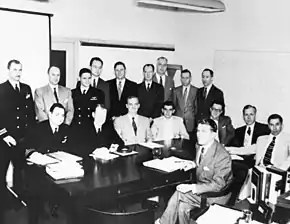Frederick C. Durant
Frederick Clark Durant III (December 31, 1916- October 21, 2015) was an American author, naval test pilot, chemical engineer, and expert in rocketry and spaceflight.[2] Durant served as a "key advisor" to U.S. military, intelligence, and space-flight programs, playing a central role in Project Orbiter, the first US satellite program.[3]
Frederick C. Durant | |
|---|---|
| Born | Frederick C. Durant, III December 31, 1916[1] Ardmore, PA |
| Died | October 21, 2015 (aged 98) Mount Dora, Florida |
| Other names | F.C. Durant |
In his later years, Durant served as assistant director of the National Air and Space Museum and an editor of Encyclopædia Britannica.[1]
Childhood and education
Durant was a descendant of Thomas C. Durant and engineer Joseph Harrison, Jr.[2] Durant's father was Frederick C. Durant Jr., an engineer educated at MIT and the Colorado School of Mines, who became president of a Telephone Company[2]
Fred C. Durant III graduated the Haverford preparatory school in 1934.[4] In 1939, Durant earned a B.S. degree in Chemical Engineering from Lehigh University.[2][1] From 1939 to 1941, Durant was employed as a chemical engineer with the E.I. Du Pont de Nemours & Co., at Pennsgrove, New Jersey.[2]
Aviator
In May 1941, Durant enlisted as a US naval aviation cadet.[2] Durant went on to serve as naval aviator and flight instructor.[2] In 1946, retired from the Navy at the rank of Commander in the Naval Reserves.[2] In 1951, Durant returned to service as a test pilot, ultimately flying some 30 different types of aircraft.[5]
Rocketry and spaceflight

In 1947, Durant began work as a rocket engineer with Bell Aircraft in Buffalo New York.[2] From 1948 to 1951, he served as Director of Engineering at the U.S. Naval Air Rocket Test Station at Dover, New Jersey.[2] In 1953, he became the President of the American Rocket Society[2][1]
Durant was a Fellow of the British Interplanetary Society,[2] the German Society for Aviation and Space Flight (DGLR),[2] and the Institute of the Aeronautical Sciences[2] Durant was a consultant to the Department of Defense, Bell Aerosystems Co., Central Intelligence Agency, others.[2] From 1954 to 1955, Durant was part of Project Orbiter, along with von Braun.[2][1][3][6]
Later life: Smithsonian director and author
In 1961, Durant moved to D.C., where he would stay until 1999.[1] In 1965, Durant became the Assistant director of National Air and Space Museum.[2] He retired from that post in 1980.[2] During his time at the Smithsonian, Durant wrote articles for Encyclopædia Britannica on rockets and spaceflight.[2] In 1983, Durant collaborated with Ron Miller and illustrator Chesley Bonestell on a book entitled "Worlds Beyond".[7] The book features a foreword by Arthur C. Clarke.[8]
Personal life
Durant was a lifelong member of Society of American Magicians.[2] He married Celeste Bennett, who died from hepatitis[2] In 1947, Durant married Carolyn Jones ("Pip"). Durnah was father to three sons and one daughters. Durant died 2015, being preceded in death by his two of his sons: Derek and William.[2][3]
References
- "Frederick Durant III, flight authority at Smithsonian, dies at 98 - The Washington Post". webcache.googleusercontent.com.
- "The Space Review: Frederick C. Durant (1916-2015)". www.thespacereview.com.
- "Full Page Reload". IEEE Spectrum: Technology, Engineering, and Science News. October 2007.
- "Frederick C. Durant III '34 - The Haverford School | All Boys Pre-K-12 Private School". www.haverford.org.
- "Frederick C. Durant | P.C. Rossin College of Engineering & Applied Science". engineering.lehigh.edu.
- Piszkiewicz, Dennis; Manwarning, Max (November 6, 1998). Wernher Von Braun: The Man who Sold the Moon. Praeger. ISBN 9780275962173 – via Google Books.
- Durant, Frederick C.; Miller, Ron (November 6, 1983). Worlds Beyond: The Art of Chesley Bonestell. Donning. ISBN 9780898651959 – via Google Books.
- "Nonfiction Book Review: The Art of Chesley Bonestell by Ron Miller, Author, Frederick Durant III, Author, Frederick C. Durant, Joint Author Paper Tiger (UK) $49.95 (256p) ISBN 978-1-85585-884-8".